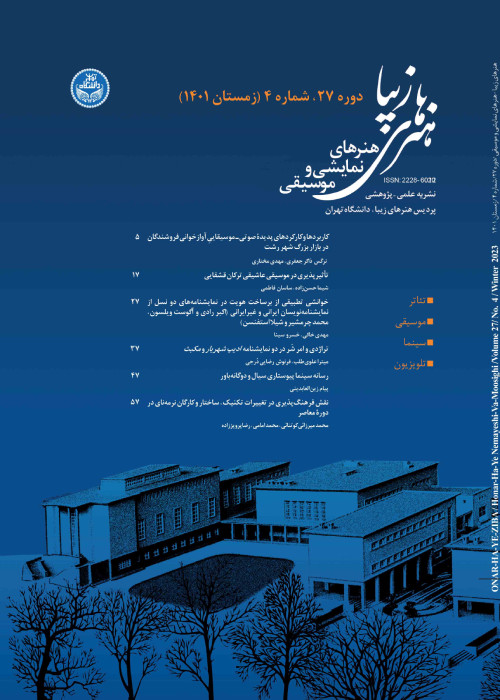A Glance at the Development of the Function of Music in Jewish Religious Life
Author(s):
Article Type:
Research/Original Article (دارای رتبه معتبر)
Abstract:
From ancient times to the present day, music as one of the earliest forms of art has had a significant role in religious ceremonies. Whether instrumental or vocal, music has been an inseparable part of rituals in almost all ancient religions. This research focuses on Judaism as one of the greatest religions in which music has always played a significant liturgical and ceremonial role. The form of music throughout the history of Judaism has gone through dramatic changes. The present article surveys the transformations of the form of music in different phases of Jewish religious life throughout history. In this research, we have covered the history of Jewish music from the beginning to the end of the first millennium C.E. The Old Testament as the earliest existing document about the early Jewish community contains useful information about the earliest forms of music in Jewish culture. Thus we have started our survey on Jewish music from the reports of musical events in the Pentateuch. We have shown that the earliest form of music in Judaism religious life has been mostly vocal music. Although, some instruments such as shofar were also used by the time of Moses. As inferred from the other books of the Old Testament, the use of the instruments in religious ceremonies became more popular after the conquest of Jerusalem by David. However, it was after the foundation of the second temple that the instrumental music reached its climax in Jewish religious life. At this time, a wide collection of ancient instruments were used in temple orchestra. Unfortunately, the grace of the music of this time started to become forgotten with the destruction of the Second Temple in 70 C.E. Since the beginnings of the great Diaspora, due to the negative rabbinic attitude toward instrumental music, the use of instruments in Jewish religious ceremonies and congregations was declared forbidden. Therefore, from that time on, music in Jewish religious life continued to exist in the form of singing in the synagogues. This occurrence led to a dramatic growth in the vocal music among the Jewish devotees. During this time, several methods for singing Biblical verses were proposed, and a few were abolished. This research reveals how the living conditions and political events in each phase of Jewish history have influenced the form of music performed in Jewish religious ceremonies as well as the attitude of the devout Jews toward music in general. At any time that the Jewish community has lost its political grace, a negative attitude toward instrumental music can be observed among the devout Jews. On the other hand, at the times of glory and victory, an increasing significance has been given to the use of instruments in Jewish music. By focusing on music in Jewish religious life alone, we have attempted to provide a historical-critical outlook on the attitude of Judaism toward music. We have shown that to what extent the religious attitude toward music can be dependent on different conditions the religious community has been facing throughout its history.
Keywords:
Language:
Persian
Published:
Honar-Ha-Ye-Ziba: Honar-Ha-Ye Mosighi Va Namayeshi, Volume:23 Issue: 57, 2018
Pages:
47 to 55
magiran.com/p1805406
دانلود و مطالعه متن این مقاله با یکی از روشهای زیر امکان پذیر است:
اشتراک شخصی
با عضویت و پرداخت آنلاین حق اشتراک یکساله به مبلغ 1,390,000ريال میتوانید 70 عنوان مطلب دانلود کنید!
اشتراک سازمانی
به کتابخانه دانشگاه یا محل کار خود پیشنهاد کنید تا اشتراک سازمانی این پایگاه را برای دسترسی نامحدود همه کاربران به متن مطالب تهیه نمایند!
توجه!
- حق عضویت دریافتی صرف حمایت از نشریات عضو و نگهداری، تکمیل و توسعه مگیران میشود.
- پرداخت حق اشتراک و دانلود مقالات اجازه بازنشر آن در سایر رسانههای چاپی و دیجیتال را به کاربر نمیدهد.
In order to view content subscription is required
Personal subscription
Subscribe magiran.com for 70 € euros via PayPal and download 70 articles during a year.
Organization subscription
Please contact us to subscribe your university or library for unlimited access!


